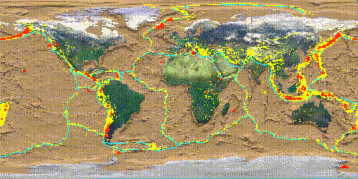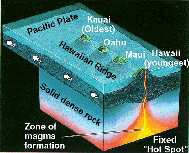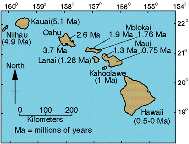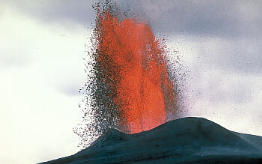Distribution of volcanic activityVolcanic activity is widespread over the earth, but tends to be concentrated in specific locations. Volcanoes are most likely to occur along the margins of tectonic plates, especially in subduction zones where oceanic plates dive under continental plates. As the oceanic plate subducts beneath the surface, intense heat and pressure melts the rock. Molten rock material, magma, can then ooze its way toward the surface where it accumulates at the surface to create a volcano. Volcanic activity can be found along the Mid-ocean ridge system as well. Here, oceanic plates are diverging and magma spreads across the ocean floor, ultimately being exposed at the surface. Crustal spreading long the ridge is partly responsible for the volcanic activity of Iceland. It is also thought that a "hot spot" lies beneath the island that contributes to volcanism. Figure 16.4 Distribution
of Volcanic Activity Note the close correlation between the site of volcanic activity (in red) and lithospheric plate boundaries. (Click image to enlarge) Hot spots" are places where a chamber of magma has accumulated at depth beneath the surface. The volcanic islands of Hawaii are a notable example of this. The Hawaiian Islands ride atop the Pacific plate as it moves in a northwesterly direction over the hot spot that creates the volcanoes. Therefore, the oldest volcanic island is found at the northwest end of the chain and the youngest to the southeast. Volcanic activity ceases as the older islands move off the hot spot.
Rather than forming a mountain like the volcanoes in the Hawaiian Islands, some places have been covered by massive flows of basaltic lava due to volcanic activity. One of the best known sites in North America is the Columbia Plateau. The Columbia Plateau is located in the eastern Washington, south through eastern Oregon and most of southern Idaho.
|



 Figure 16. 7 Lava
fountain of the Pu`u `O`o cinder and spatter cone on
Kilauea Volcano, Hawaii. Source:
USGS Used with permission
Figure 16. 7 Lava
fountain of the Pu`u `O`o cinder and spatter cone on
Kilauea Volcano, Hawaii. Source:
USGS Used with permission